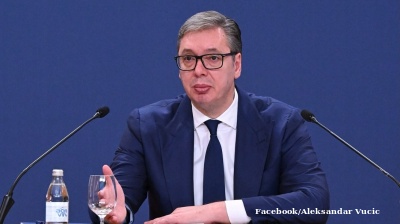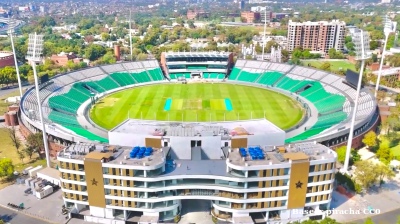Ahead of the St. Petersburg International Economic Forum (SPIEF) in June, the Kremlin has handed a public relations victory to the Taliban.
Despite officially being banned as a terrorist organisation, turbaned delegates from Kabul mingled with Russia’s captains of industry and international dignitaries at what has been dubbed “the Russian Davos.”
The Russian foreign and justice ministries submitted a formal proposal to President Vladimir Putin to remove the Taliban from Russia’s list of designated terrorist organisations in June. The Taliban has been on this list since 2003, alongside groups like al-Qaeda, for supporting separatists in the North Caucasus, writes journalist Kirill Krivosheev in a paper for Carnegie Endowment for International Peace.
Kazakhstan has already removed the Taliban from its terrorist list in December 2023, though it only began discussing it publicly this June. In another key Central Asian country, Uzbekistan, the Taliban has never been designated as extremist. Uzbek diplomats have been leading efforts to have the Taliban recognised as a regional power and Uzbek President Shavkat Mirziyoyev stated the need to stabilise the situation in Afghanistan as the region’s top security issue in his first speech to the UN after taking office in 2016.
When the Taliban seized Kabul in August 2021 amid the chaotic exit of Western armed forces, stability has been maintained to some extent, largely due to the continuous flow of billions of dollars in humanitarian aid. Afghanistan’s Central Asian neighbours decision to refuse to take refugees has also helped ensure that the country's tragedy remains a domestic issue without creating a refugee crisis for the other members of the region.
Fears that terrorist groups would establish strongholds in Afghanistan have not materialised, says Krivosheev. However, Afghanistan-based cells of the Islamic State Khorasan (ISIS-K), which was behind the recently Crocus City Hall mall terrorist attack in Moscow on March 22, have grown stronger.
Moscow’s frequent contact with the Taliban and the move to remove this organisation from its list of terrorist groups suggest it is seeking closer cooperation with Kabul in the fight against ISIS-K. Additionally, Moscow harbours hopes of developing economic ties with the Taliban. According to the World Bank, Afghanistan’s imports were worth $7.8bn in 2023, and its exports amounted to $1.9bn – small figures for a country of over 40mn people. Russia remains a significant trade partner, with the Russian Business Centre in Afghanistan estimating trade at about $1bn, although Russian Deputy Prime Minister Alexei Overchuk has cited a more modest figure of $560mn.
Uzbekistan’s trade with Afghanistan was just $784mn in 2023, making it highly unlikely that trade with Russia is higher, according to Krivosheev.
Russian officials have also begun discussing using Afghanistan as a transit hub for exporting natural gas to India and other goods to ports in Pakistan. However, this would require building a gas pipeline through the mountains and extending the railway that currently ends at Mazar-i-Sharif on the Uzbek border.
While the North-South Corridor from Russia to the Indian Ocean via Azerbaijan and Iran has a chance of becoming a reality, the proposed railway from Afghanistan to Pakistan only remains a distant possibility.
The extent of economic ties between Kazakhstan and Afghanistan are also unclear. While Astana claims its trade with Afghanistan is worth $1bn, the Taliban has stated that the country only received $340mn worth of goods from Kazakhstan from March 2022. Afghanistan primarily needs flour, grain and oil products, which Kazakhstan can provide more quickly and cheaply than Russia.
Afghanistan is believed to be rich in natural resources. The New York Times famously reported in 2010 a Pentagon assessment of Afghanistan's mineral wealth that estimated it at $1 trillion, and called the country the "Saudi Arabia of lithium."
In May, a Taliban delegation visited the Russian city of Kazan to discuss investment in the oil and gas sector, but no concrete agreements were reached. Similarly, Russian engineering company KER-Holding has been promising but has failed to start building a power plant in Afghanistan for several years.
Beijing has been cautious about investing in Afghanistan in recent years. War-torn Afghanistan reportedly has hundreds of millions of dollars of hard-to-find lithium deposits. China is already a major home and producer of rare earth metals and potentially the business partner that the Taliban can turn to. Beijing already reached out to the Taliban leadership in July, well before the collapse of the US-backed government in Kabul, and has been one of the few great powers to have kept its embassy in the Afghan capital open since the change of power. However, China's previous attempts to develop the Afghan subsoil have so far ended in failure.
The only significant Chinese investment is the $49mn that Xinjiang Central Asia Petroleum and Gas Co. has spent on developing oil fields near Herat.
Investment is challenging due to ongoing political instability, as Afghanistan remains the least peaceful country in the world. Despite being in power for nearly three years, the Taliban has created few functioning state institutions, and it is unclear who runs the country, with rumours that the Taliban’s supreme leader Haibatullah Akhundzada may be dead.
Nevertheless, Russia, Kazakhstan and other Central Asian states have little choice but to lift restrictions on the Taliban. The Taliban’s interior minister, Sirajuddin Haqqani, is wanted by the FBI, which has offered up to $10mn for information on his whereabouts. Yet earlier this month the UN Security Council lifted travel restrictions for him and three other Taliban leaders to allow them to travel to Mecca.
Opinion

Armenia’s painful reorientation toward the West
Yerevan’s drive to break free from its dependency on Moscow is generating profound internal political turbulence and exposing it to new external risks, says a report by the Central Asia‑Caucasus Institute & Silk Road Studies Program.

COMMENT: Europe’s “fake it till you make it” war approach cannot hold off Russia’s trillion dollar war machine
In their speeches on the war in Ukraine, European leaders appear like a video clip looped on repeat. Standing before the cameras they declare new packages of support for Kyiv and threaten new measures to pressure Russia as if it was still 2022.

A year after the Novi Sad disaster, Belgrade faces one crisis after another
Serbia’s government is grappling with a convergence of crises which threaten to erode President Aleksandar Vucic’s once-dominant position.

Don’t be fooled, Northern Cyprus’ new president is no opponent of Erdogan, says academic
Turkey’s powers-that-be said to have anticipated that Tufan Erhurman will pose no major threat.




